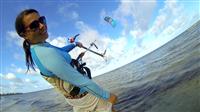Asia is a Polish expat who initially moved to Kenya for an internship position in 2007. She now lives in Mombasa and has worked in the tourism and real estate industries over the past few years. Asia finds the locals friendly and loves the fact that she is a five-minute walk from the beach.
Read more about Kenya in the Kenya expat guide and more expat experiences in Kenya.
About you
 Q: Where are you originally from?
Q: Where are you originally from?
A: Gdynia, Poland
Q: Where are you living now?
A: Mombasa – Nyali, Kenya
Q: When did you move to Kenya?
A: September 2007
Q: Did you move with a spouse/children?
A: No
Q: Why did you move to Kenya; what do you do?
A: I got an internship after graduating from University for Real Estate Company.
About Mombasa
Q: What do you enjoy most about Mombasa, how’s the quality of life?
A: The fact that I live a five-minute walk from the beach. The state of roads and traffic jams are annoying; however, the fact that it is almost always warm and sunny makes up for it.
Q: Any negatives? What do you miss most about home?
A: I get to miss some of the Polish traditional dishes but then again I do enjoy eating Swahili food as well.
Q: Is Mombasa safe? Are there any areas expats should avoid?
A: I guess like in every country there are areas where you shouldn’t walk around in the night; however, Nyali where I live is a safe neighbourhood.
Q: How would you rate the public transport in Mombasa? What are the different options? Do you need to own a car?
A: The public transport is not very comfortable, nor is it the safest. Public buses, called matatu, are usually in bad technical shape and their drivers are famous for speeding. There is also a tuk-tuk and boda-boda which is a form of a motorbike pulled taxi. Owing a car is very helpful. Most of the new expats own a car with the driver. (Traffic in Mombasa can be very confusing).
Q: How would you rate the healthcare in Kenya?
A: There are a number of private hospitals which have good service. Finding a good dentist took me a while but I managed. I think proper insurance is important.
About living in Mombasa
Q: Which are the best places/suburbs to live in Mombasa as an expat?
A: There are a few peaceful districts such as Nyali where I live, an area called English Point, Tudor and State House area close to town centre are also good areas.
Q: How do you rate the standard of housing in Mombasa?
A: There are very many new developments, many very luxurious homes, although they have European prices as well.
Q: What’s the cost of living compared to home? What is cheap or expensive in particular?
A: It is generally cheaper than Poland; however, not everything. I would say the basic goods used commonly by local people are cheap; however, anything that is considered not a must like cars and computers are expensive. Things from abroad are also costly due to high duty. One’s monthly expenses will depend on lifestyle really.
Q: What are the locals like; do you mix mainly with other expats?
A: Locals are very friendly; I mix both with Kenyans and expats alike.
Q: Was it easy meeting people and making friends in Mombasa?
A: It is definitely easy to meet people, but to make a friendship one has to be really careful. Most of society is very poor so expats will often be looked at as someone with a lot of money and people may try to take advantage of them.
About working in Mombasa
Q: Did you have a problem getting a work visa/permit for Kenya?
A: Tourist visa is easily accessible on arrival. When I came first I was hired by a big company which arranged all the work permit procedures. However, when I finished that project and I was trying to find new work and arrange for work permit myself it was extremely difficult and expensive.
Q: What’s the economic climate like in Mombasa; is there plenty of work?
A: Unemployment in Kenya is definitely high, though there are some sectors that need specialists. It is easier to find a job while in your home country and be sent here by a company than just to arrive and start looking for work.
Q: How does the work culture differ from home?
A: People on the coast are generally famous for being easy going and NEVER in a hurry. But again it depends on the company really – there are very many foreign or new companies that are being competitive and people are working hard in them.
Q: Did a relocation company help you with your move?
A: No, I didn’t feel I needed one.
And finally…
Q: Is there any other advice you would like to offer new expat arrivals?
A: Get involved in some part time activities or clubs. It will make your life much easier to know many people. Mombasa has recreational activities to offer but they are not always marketed very well. There is a range of water sport activities due to beautiful ocean and beaches as well as wildlife and natural attractions.
~Interviewed May 2013


